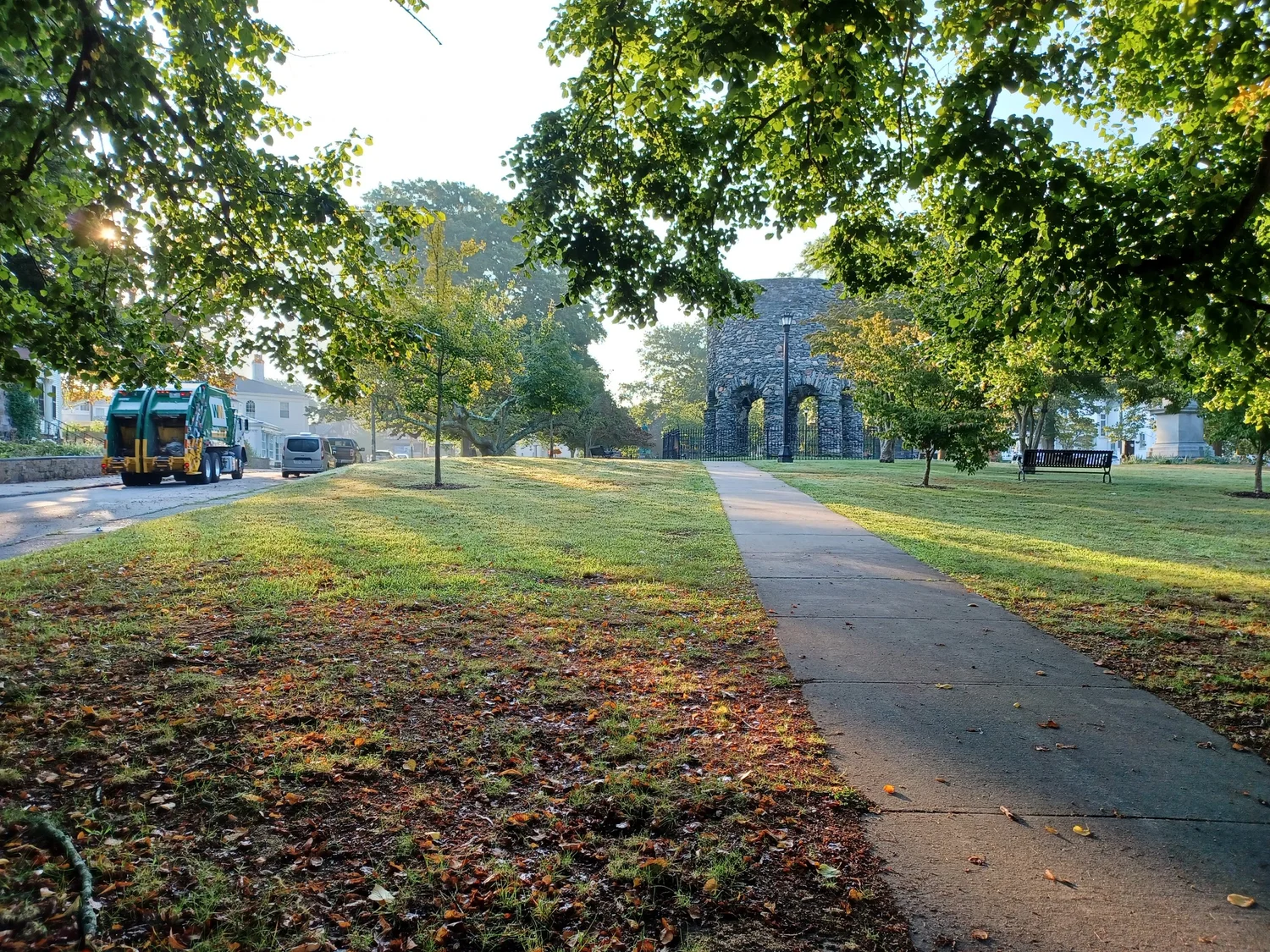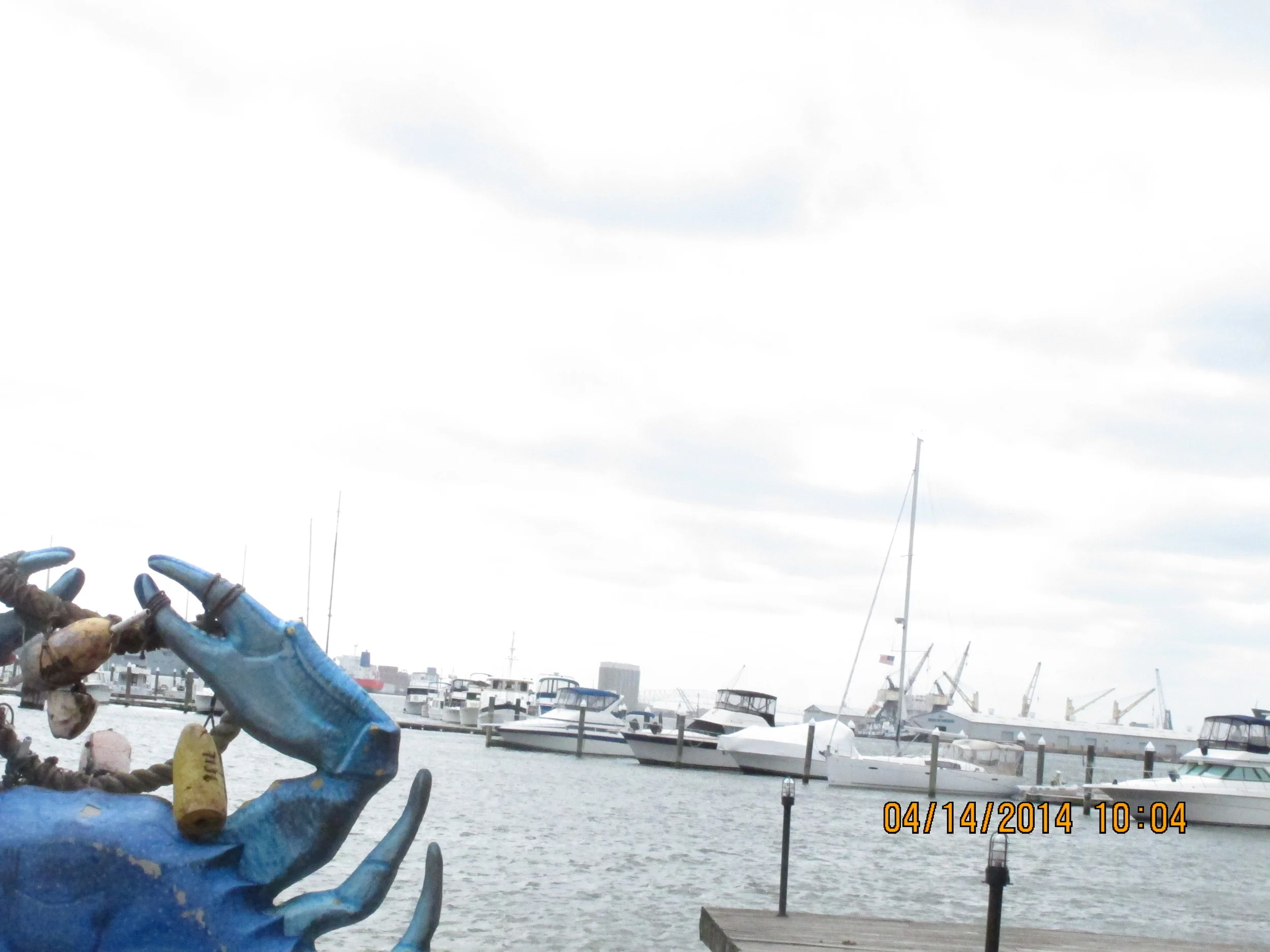Pulling Through Nazareth
/What happens in the split second when you realize that the person facing you has no desire to photograph or label you and is indeed standing there hoping to learn what’s troubling you? I can tell you. I’ve seen it on hiking trails, shimmying around boulders. I’ve seen it spill across paths and beaches on Rhode Island’s Newport tourist trail. And I’ve seen it as I’ve walked through American suburbs, getting out the vote.
It’s a lowering of shoulders, a raising of a chin, a break in the imaginary. It’s an invitation to discard the avatar and attend to the actual. It’s not close to an elixir for the silence and the suspicions that shroud most American days these days, but it’s palliative and has potential. I’ll zoom in on two moments of the smile here, and leave the essay unsure of what lingers.
And I’ll tell you what unspools below the cerulean photo even as I update this the morning after Donald Trump decisively won the presidency. The outcome, which I sought to forestall, underscores how fragile is the moment I want to hold onto. To keep its contours in place, you have to nestle it under something stretchy and reflective and hold it hard.
The same goes for civility itself.
So in October 2023, I was walking around Sterling, Virginia, canvassing for the Sister District Project. A guy in his garage saw me approaching. He raised his shoulders and narrowed his eyes. He said no thanks.
He was fixing the chain on a little kid’s bike, which lay at his feet. Other bikes leaned nearby. I said all I wanted was to ask if he would find time to work on my kid’s bike. And then the reaction occurred. I welcome it and have seen it many times.
The man squints for a moment, letting himself affirm that all that arrays before him is a friendly different man. He lowers his shoulders. He engages with a smile or chuckle.
When this happened in Sterling, I made my pitch for the state-legislative candidate I was supporting. (Her name is Russet Perry. She won.) We chatted for about 45 seconds. He said he was planning to vote for her. I thanked him and moved on.
The work my companions and I do for Sister District each year involves marshaling volunteers from politically predictable places to support Democratic contenders in close state races. We get to talk to voters on their doorsteps about things like public school funding, opening hours for county job offices, industrial zoning. That is, we get to talk about life.
There is a moment where it sinks in: all there is before you is someone with nothing to sell, with an opinion and some positions for you to consider, with appreciation for your time. If I could bottle that moment and deliver it as a pill, I would take it every day I bike to work and I would hope for the government to stockpile it.
One outcome to note is that people can gain pep and calm in a perfect soft-serve-chocolate-vanilla swirl not necessarily from seeing their side win, but from sharing genuinely friendly behavior. This confers a privilege.
When you get to speak to people, you also get to listen to them. A number of preconceptions pop into the autumn air. One voter thought my candidate hadn’t done enough in office - and he was right, because she had never held office. I know not how he chose to vote in 2022, but I know he was nodding as I spoke and making calm eye contact as I said goodbye, and I know the candidate I supported won by 58 votes.
It also delivers surprises. On a sunny September Saturday, I walked around an upscalish community talking mainly to registered independents and Republicans about my candidate’s commonsense proposals on zoning and lowering property taxes.
The canvassing handbook says you accomplish most in pairs and that individual men garner the fewest conversations, but I spoke to 13 folks for what you can technically measure as a good long while.
I later guessed with my wife and friends that seeing a middle-aged white guy just wanting to be helpful seemed so refreshing that people let down their guard. But people generally let down their guard, once they see that you are there to learn and collaborate. They don’t generally change their minds, but they sometimes do, and your assumptions change.
I’m the lucky one in these moments, because I get to share an envelope of time in which I and the other man stop being types, or demographic signifiers, or others, and start being neighborly. I wish I had taken more time to learn what goes on in these neighborhoods- and in the future, I will try to do that.
These moments when the guard falls are real, and twinkle in instant memory. In Nazareth, PA on the first Sunday of November, I was canvassing for Sister District again with my son at my side. The neighborhood looked at times like a chess board of Trump signs and Harris signs. People walking their dogs said hello, sometimes with a clipped inflection that translates to “I see you there on the landing, with your flyers, I see you squunching at the addresses on your app.” As we walked along, a guy at a corner was hosing down his car in the sunshine.
“Hey,” I called, and pointed toward my son. “His room could use a cleaning, too.”
“WHAT?!” said the man. I repeated the joke.
Again, the shoulders lowered and the eyes relaxed. He made a joke at the same level (which is to say, pacific and instantly forgettable) and on we walked.
Now. History acts as a terrier on our terry-cloth impressions, and as it happened the 2024 campaign saw thousands of enthusiastic volunteers knock on doors of millions of unenthused voters. We lacked time and basis with which to earn some of their enthusiasm. We didn’t know, or didn’t acknowledge, what we didn’t know.
When you start conjuring moments of friendliness as pulses of emotional glucose, it cues you to start wondering why the taste in your mouth remains bitter. One factor to consider involves how rare these moments are - intensely in tight-packed Manhattan, where you can course through new parks like the one below and never share a nod.
And that deficit rears back, like a shadow over what I had tried to assume in my writing. I had tried to assume that magic escapes into the air when shoulders lower, but I now see that the friendly current remains just one ingredient of what we all breathe.
Hard conversations, not easy ones, form footholds to the mesa where the lowering shoulders and emerging smile can become pulses of light. When someone sees you as an equal and not as a would-be teacher or preacher, you two can stand on equal foggy ground, ready to name and then define what you don’t know and need to know.
We’ve got a long way to go, if you measure by our expectations. Five nights after Election Day, we were in the suburbs of my town to celebrate my dad’s 88th birthday at the restaurant where he and my mom were once regulars. My son wanted the Knicks game on one of the TVs crowning the bar, which were both showing out-of-town NFL action. He decided on his own to ask the bartender if she would change the channel.
So off he went. When he came back, he said that she had agreed - and that a guy at the bar (one of three folks perched there) had said to him: “Good for you.”
I smiled. “I think he thought it was surprising that I was talking to people,” my son said.
The next week, I was biking from Manhattan to my Brooklyn cubicle. A woman ahead of me was waiting for the light to change. I said “on your left, please” and she said “thanks” and I felt my chest lift as if I had pulled a shivering child from a frozen brook.
My son and I used to come to the dinner table with stories of “nice interactions” we’d had that day on bikes - just as I held onto the moments on canvasses. But now I see the moment curdles if it remains a moment. If we’re going to keep poison out of the air and the discourse, talking to strangers at any age needs to become a lot less surprising.




